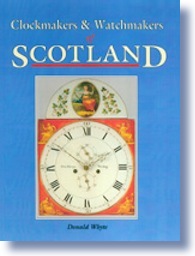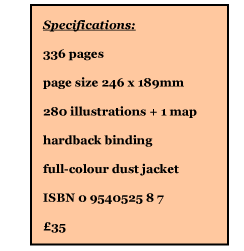

BUY THIS BOOK
Clockmakers & Watchmakers of
SCOTLAND
by Donald Whyte
Scotland has a long history of clockmaking, stretching back to the fifteenth century, when clocks were installed in monasteries, friaries and castles. Some of these clocks came from England, Holland and Flanders, others were made locally, but they were all maintained and repaired by local blacksmiths or locksmiths. By the end of the seventeenth century a number of craftsmen were making domestic clocks in Scotland, in particular Humphry Mills of Edinburgh, who is the earliest Scottish clockmaker whose clocks survive.
The eighteenth century brought a expansion in clockmaking in Scotland, with clockmakers working in all the large towns and also many smaller settlements. Although some clocks came from London, longcase clocks made in Scotland soon established a style of their own - invariably of eight-day duration (apart from the lantern clocks made by Humphry Mills, Scottish thirty-hour clocks are virtually unknown), and with arched dials. Clock cases were similarly distinctive, those from Edinburgh being of particularly pleasing proportions. By the nineteenth century painted-dial clocks made in Scotland had dials and cases which were uniquely different from anything produced south of the border. Not only was the Scottish 'drumhead' clock produced in large numbers, longcase clocks of traditional type were still being made into the twentieth century, long after they had fallen out of favour elsewhere.
This book is based on detailed original research on the clockmakers, watchmakers, cabinetmakers, dialmakers and suppliers, who were involved in the trade. Records have been consulted from the earliest times to the 1881 Census. The latter not only records those who moved from clockmaking to being retail jewellers and goldsmiths, but also their apprentices and journeymen. Itinerant watch cleaners and repairers travelled the Highlands in search of business, while others fell on hard times and ended up in the workhouse, asylum, or prison.
This book includes 280 illustrations of Scottish clocks, watchpapers and other documents. It will be of interest not only to horologists and collectors of Scottish clocks, but also local historians and genealogists.
CONTENTS
Introduction
Scottish Longcase clocks (by John Robey)
Clockmakers & Watchmakers of Scotland
Berwick-on-Tweed
Apprentice Indenture of George Lumsden to John Smith of Pittemweem
Bibliography
Index
